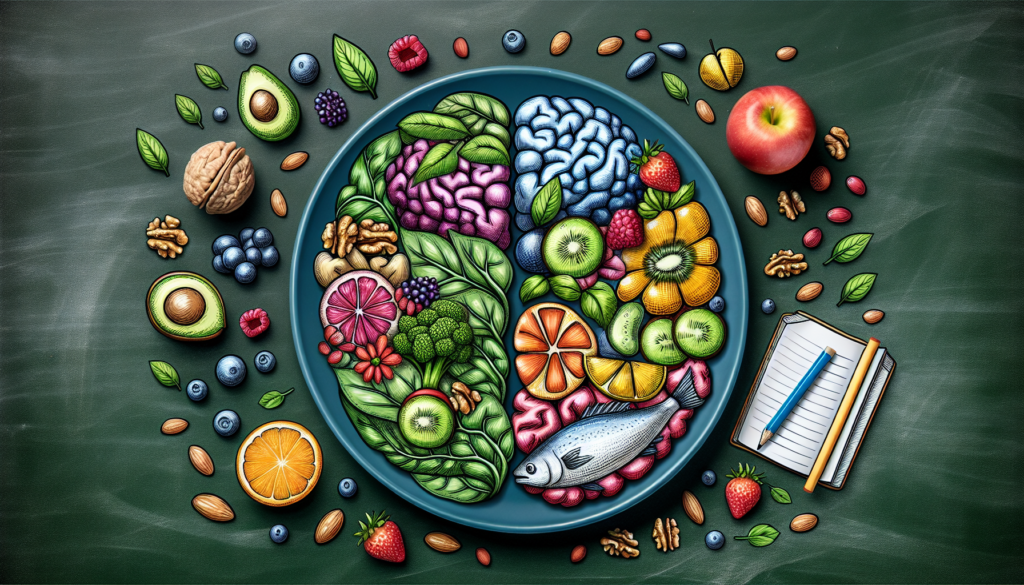Imagine if you could enhance your ability to learn and remember by simply changing what you eat. If you’ve ever wondered about the connection between your diet and your cognitive abilities, look no further. In this article, we will explore the fascinating relationship between diet and learning and memory. Discover how certain foods can boost brain function, prevent cognitive decline, and even improve your academic performance. From fruits and vegetables to omega-3 fatty acids, embark on a journey to uncover the secrets behind maximizing your brainpower through the power of nutrition.
The Role of Nutrition in Cognitive Function
Introduction to cognitive function and its importance
Cognitive function refers to the mental processes involved in acquiring, processing, storing, and retrieving information. It encompasses various aspects such as attention, memory, language, problem-solving, and decision-making. Cognitive function is crucial for everyday tasks, academic performance, and overall quality of life.
Exploring the relationship between diet and cognitive function
Research has shown that diet plays a significant role in cognitive function. The food we consume provides the necessary nutrients for brain health and influences our mental capabilities. A diet rich in essential nutrients can enhance cognitive function, while a poor diet can impair it. Therefore, it is important to understand the relationship between diet and cognitive function to optimize brain health.
Impact of nutrient deficiencies on cognitive function
Nutrient deficiencies can have a detrimental effect on cognitive function. For example, inadequate intake of vitamins, minerals, and essential fatty acids can impair memory, attention, and overall cognitive performance. Nutrients like iron, iodine, omega-3 fatty acids, and B vitamins are particularly important for cognitive function. Therefore, it is crucial to maintain a balanced diet that provides all the necessary nutrients for optimal brain health.
Effects of malnutrition on learning and memory
Malnutrition, both in the form of undernutrition and overnutrition, can have profound effects on learning and memory. Chronic malnutrition, often experienced in impoverished communities, can lead to stunted brain development and poor cognitive abilities. On the other hand, excessive calorie intake and consumption of unhealthy foods, such as those high in sugar and saturated fats, can impair learning and memory processes. Therefore, it is important to consume a nutritious diet to support optimal learning and memory functions.
The Influence of Macronutrients on Learning and Memory
Importance of macronutrients in brain health
Macronutrients, including carbohydrates, proteins, and fats, are essential for maintaining brain health and supporting optimal cognitive function. These nutrients provide energy, build neurotransmitters, and support the structure and function of the brain. A balanced intake of macronutrients is necessary to enhance learning and memory processes.
Carbohydrates: The brain’s primary energy source
Carbohydrates are the brain’s primary source of energy. Glucose, derived from the breakdown of carbohydrates, is used by the brain to fuel its functions. Consuming complex carbohydrates, such as whole grains, fruits, and vegetables, ensures a steady supply of glucose to the brain, promoting optimal learning and memory abilities.
Proteins: Building blocks for neurotransmitters
Proteins are essential for the production of neurotransmitters, the chemical messengers that facilitate communication between brain cells. Consuming protein-rich foods, such as lean meats, poultry, fish, legumes, and dairy products, ensures an adequate supply of amino acids, the building blocks of proteins. These amino acids are crucial for neurotransmitter synthesis and play a vital role in learning and memory processes.
Fats: Essential for brain structure and function
Fats, particularly omega-3 fatty acids, are essential for maintaining brain structure and function. The brain is composed of approximately 60% fat, and omega-3 fatty acids are crucial for the formation and maintenance of cell membranes in the brain. Consuming foods rich in omega-3 fatty acids, such as fatty fish, nuts, and seeds, can support optimal brain health and enhance learning and memory abilities.

Micronutrients and Cognitive Performance
Key micronutrients for optimal brain function
In addition to macronutrients, micronutrients also play a vital role in cognitive performance. Micronutrients, including vitamins and minerals, are necessary for various biochemical reactions in the brain. Some key micronutrients for optimal brain function include vitamin B12, vitamin D, iron, zinc, magnesium, and iodine. Consuming a diverse range of fruits, vegetables, whole grains, and lean proteins can help ensure an adequate intake of these micronutrients.
Vitamins and minerals that enhance learning and memory
Certain vitamins and minerals have been found to enhance learning and memory abilities. Vitamin B12, for example, is essential for the production of red blood cells and the maintenance of nerve cell function. Adequate intake of vitamin B12, found in animal products like meat, fish, and dairy, can support optimal cognitive function. Similarly, minerals like iron and zinc play a crucial role in neurotransmitter synthesis and overall brain health. Foods rich in these minerals include lean meats, legumes, nuts, and seeds.
Role of antioxidants in protecting cognitive abilities
Antioxidants, such as vitamins C and E, beta-carotene, and flavonoids, have been shown to protect the brain from oxidative stress and inflammation. These compounds neutralize harmful free radicals and reduce cellular damage, which can contribute to cognitive decline. Consuming a variety of antioxidant-rich foods, such as berries, citrus fruits, leafy greens, and nuts, can support cognitive function and protect against age-related cognitive decline.
The Gut-Brain Connection and Cognitive Health
Overview of the gut-brain axis
The gut-brain axis refers to the bidirectional communication between the gut and the brain. The gut is home to trillions of bacteria, collectively known as the gut microbiota, which play a crucial role in various physiological processes, including brain function. The gut and brain communicate through neural, hormonal, and immune pathways, influencing cognitive health.
Effects of a healthy gut microbiome on cognition
A healthy gut microbiome has been linked to improved cognitive function. The gut microbiota produce neurotransmitters, such as serotonin and dopamine, which regulate mood and cognition. Additionally, they interact with the immune system, producing anti-inflammatory compounds that support brain health. By maintaining a diverse and balanced gut microbiome through a nutritious diet, individuals can support optimal cognitive function.
Influence of diet on gut microbiota composition
Diet plays a significant role in shaping the composition of the gut microbiota. Consuming a diet rich in fiber, found in fruits, vegetables, whole grains, and legumes, promotes the growth of beneficial bacteria in the gut. On the other hand, a diet high in processed foods, sugar, and unhealthy fats can disrupt the balance of the gut microbiota and increase inflammation, negatively impacting cognitive function. Therefore, adopting a healthy diet is vital for optimizing gut microbiota composition and promoting cognitive health.
The role of probiotics in cognitive function
Probiotics have gained considerable attention for their potential role in cognitive function. These beneficial bacteria, found in fermented foods like yogurt, sauerkraut, and kimchi, can influence the gut-brain axis and support optimal cognitive health. Probiotics have been shown to reduce inflammation, improve mood, and enhance cognitive performance. Including probiotic-rich foods in the diet can be a valuable strategy for improving cognitive function.

Sugar and Its Impact on Learning and Memory
The link between excessive sugar intake and cognitive decline
Excessive sugar intake has been linked to cognitive decline. Consuming large amounts of sugar, particularly in the form of added sugars and sugary beverages, can lead to insulin resistance and inflammation in the brain. These processes have been associated with impaired cognitive function and an increased risk of developing conditions like Alzheimer’s disease. Limiting sugar intake, especially refined sugars, is crucial for preserving learning and memory abilities.
Effects of high-sugar diet on memory formation and recall
A high-sugar diet can negatively impact memory formation and recall. Research has shown that excessive sugar consumption can impair synaptic plasticity, the ability of brain cells to form and strengthen connections, which is essential for learning and memory processes. Additionally, high blood sugar levels can lead to oxidative stress and damage to brain cells, further compromising memory function. By reducing sugar intake and opting for healthier alternatives, individuals can support optimal memory performance.
Neurological consequences of chronic sugar consumption
Chronic sugar consumption has been associated with several neurological consequences. Studies have shown that a sugar-rich diet can increase the risk of developing cognitive disorders like dementia and impair overall cognitive function. Furthermore, excessive sugar intake can lead to inflammation, insulin resistance, and impaired glucose metabolism in the brain, all of which can contribute to cognitive decline. It is essential to be mindful of sugar consumption and prioritize a balanced diet for long-term brain health.
The Mediterranean Diet and Cognitive Health
Introduction to the Mediterranean diet
The Mediterranean diet is a dietary pattern inspired by the traditional eating habits of countries bordering the Mediterranean Sea. It is characterized by high consumption of fruits, vegetables, whole grains, legumes, nuts, seeds, fish, and olive oil. The Mediterranean diet has been widely researched and recognized for its numerous health benefits, including its positive impact on cognitive health.
Benefits of the Mediterranean diet on brain function
The Mediterranean diet has been associated with improved cognitive function and a reduced risk of cognitive decline and dementia. Its emphasis on whole foods, healthy fats, and plant-based ingredients provides a wide range of nutrients that support brain health. The diet’s high intake of antioxidants, omega-3 fatty acids, and polyphenols contributes to its neuroprotective effects, enhancing learning, memory, and overall cognitive abilities.
Specific components of the diet promoting learning and memory
Several components of the Mediterranean diet have been identified as particularly beneficial for learning and memory functions. The consumption of fatty fish, rich in omega-3 fatty acids, has been linked to better cognitive performance. Olive oil, a key component of the Mediterranean diet, is a source of monounsaturated fats and antioxidants that support brain health. Additionally, the abundance of plant-based foods in the diet provides essential nutrients and phytochemicals that promote optimal cognitive function.
Impact of Fast Food and Processed Foods on Cognition
Overview of fast food and processed food consumption
Fast food and processed food consumption has become increasingly prevalent in today’s society. These foods are typically high in unhealthy fats, refined sugars, salt, and artificial additives, while lacking in essential nutrients. The regular consumption of such foods can have detrimental effects on cognitive abilities and overall brain health.
Negative effects of fast food on cognitive abilities
Fast food consumption has been linked to impaired cognitive function. Research has shown that diets high in fast food are associated with poor attention, memory, and learning abilities. The high levels of saturated fats and trans fats in fast food can lead to inflammation and oxidative stress in the brain, which can negatively impact cognitive performance. Minimizing fast food intake is crucial for preserving cognitive abilities.
Artificial additives and their influence on learning and memory
Many processed foods contain artificial additives, such as food dyes, preservatives, and flavor enhancers, which can adversely affect learning and memory processes. These additives have been associated with hyperactivity, poor attention, and impaired cognitive function, particularly in children. Avoiding processed foods and opting for whole foods can help eliminate the harmful effects of artificial additives on cognitive health.
Nutrition Strategies for Optimizing Learning and Memory
Balancing macronutrient intake for cognitive enhancement
To optimize learning and memory, it is important to maintain a balanced intake of macronutrients. This can be achieved by including a variety of whole grains, lean proteins, healthy fats, and fruits and vegetables in the diet. Balancing carbohydrate intake to provide a steady supply of glucose, consuming adequate protein for neurotransmitter synthesis, and incorporating healthy fats for brain structure and function can enhance cognitive abilities.
Incorporating brain-boosting superfoods into the diet
Certain foods are known as “brain-boosting superfoods” due to their specific nutrients and compounds that support cognitive function. These include blueberries, which are rich in antioxidants; turmeric, which contains the compound curcumin with anti-inflammatory properties; and dark chocolate, which contains flavonoids that enhance blood flow to the brain. By incorporating these superfoods into the diet, individuals can provide their brains with essential nutrients for optimal function.
Meal timing and its impact on cognitive performance
Meal timing can also impact cognitive performance. Consuming regular, well-balanced meals throughout the day ensures a steady supply of nutrients to the brain. Skipping meals or having irregular eating patterns can result in fluctuations in blood sugar levels, leading to impaired cognitive function. Additionally, studies have shown that eating a nutritious breakfast can enhance attention, memory, and overall cognitive abilities. Therefore, it is important to prioritize consistent meal timing for optimal cognitive performance.
Hydration and its role in brain function
Staying properly hydrated is essential for optimal brain function. Dehydration can lead to fatigue, poor concentration, and impaired cognitive abilities. Drinking an adequate amount of water throughout the day ensures optimal hydration, supporting cognitive performance. Additionally, some research suggests that mild dehydration can negatively impact mood and memory, highlighting the importance of maintaining proper hydration for overall cognitive health.
The Importance of Adequate Sleep in Cognitive Function
Relationship between sleep and learning/memory consolidation
Sleep plays a crucial role in learning and memory consolidation. During sleep, the brain processes and consolidates newly acquired information, forming long-term memories. Sufficient sleep is essential for optimal cognitive function, as it enhances attention, creativity, problem-solving, and overall learning abilities.
Effects of sleep deprivation on cognitive abilities
Sleep deprivation can have a profound negative impact on cognitive abilities. Studies have shown that even a single night of inadequate sleep can impair attention, working memory, and decision-making. Chronic sleep deprivation has been linked to an increased risk of developing cognitive disorders like Alzheimer’s disease. Adequate sleep is necessary for optimal cognitive function, and individuals should prioritize getting the recommended 7-9 hours of sleep per night.
Dietary factors affecting sleep quality
Dietary factors can also influence sleep quality. Consuming excessive amounts of caffeine, particularly close to bedtime, can interfere with sleep. Alcohol consumption, although it may initially induce drowsiness, can disrupt the sleep cycle and lead to poor sleep quality. Additionally, consuming heavy meals before bed can cause discomfort and disturb sleep. Opting for a balanced diet, avoiding stimulating substances before bedtime, and spacing out meals appropriately can contribute to better sleep quality and, subsequently, improved cognitive function.
Conclusion
In conclusion, nutrition plays a crucial role in cognitive function, learning, and memory. A well-balanced diet, rich in essential macronutrients and micronutrients, supports optimal brain health and enhances cognitive abilities. The Mediterranean diet, with its emphasis on whole foods, healthy fats, and plant-based ingredients, has been shown to be particularly beneficial for cognitive health. On the other hand, the consumption of fast food and processed foods, high in unhealthy fats and artificial additives, can impair cognitive abilities. It is important to adopt a healthy diet, incorporate brain-boosting superfoods, and prioritize adequate sleep and hydration to optimize learning and memory abilities. By understanding the impact of diet on cognitive function and making informed dietary choices, individuals can support their brain health and ensure optimal cognitive performance throughout life.

